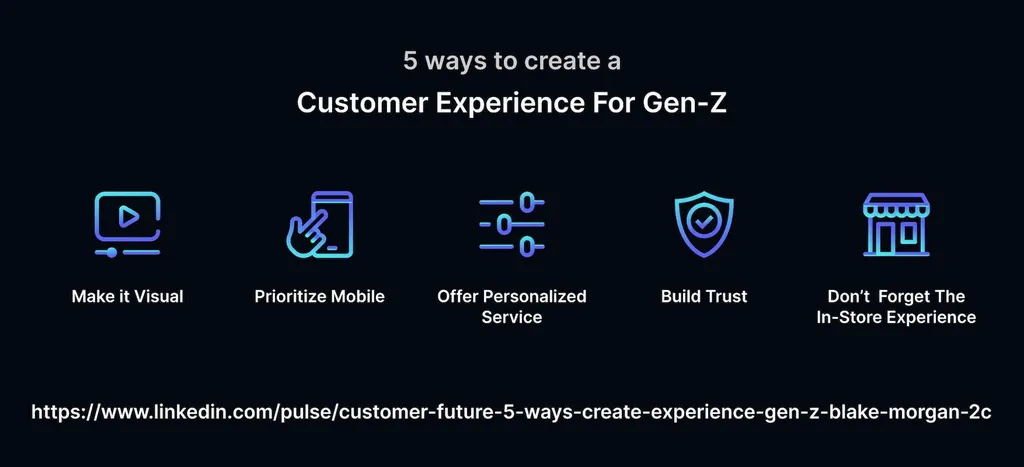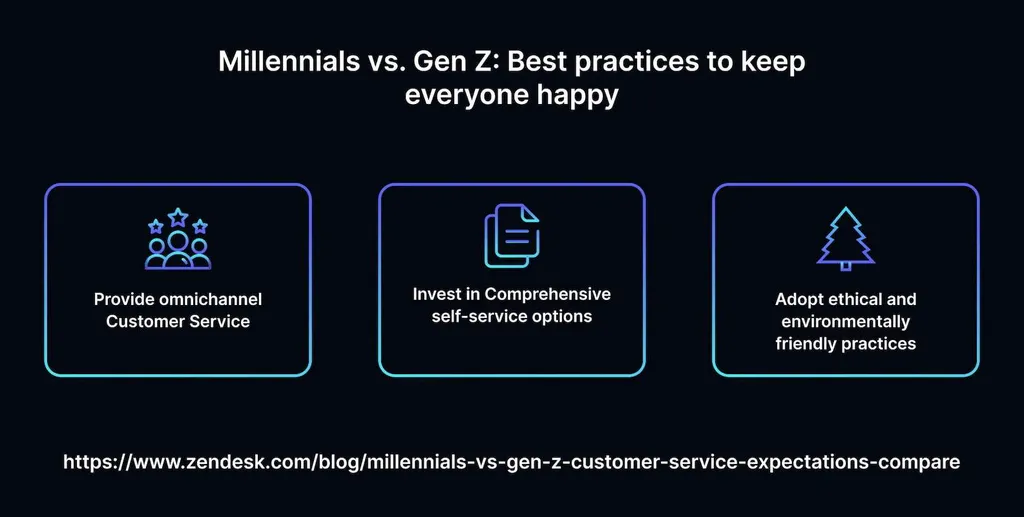Customer support (CS) automation is predicted to shape the future of retail, healthcare, finance, and other industries. The demographic shift signifies that Gen Z will soon become the major consumer segment. Learning more about the generation is necessary to address its needs. Known for their advanced social skills and high empathy, the clients require top-notch Gen Z customer service to maintain brand loyalty.
Born between the mid-1990s and early 2010s, such individuals do not accept low-effort solutions and have high expectations. We will explore how the market reacts to CS strategies to entice the most discerning customers with impressive purchasing power.
What is Gen Z Customer Service?
This type of service focuses on providing a flawless client experience (CX) at every stage of a client’s journey. CS systems, fine-tuned to meet the target audience’s needs, help teams offer tailored assistance and prompt responses.
While most people expect to get top-notch services when contacting companies and organizations, the statistical data shows that overall satisfaction levels continue to decrease. In 2023, live chat support had an average satisfaction rate of 85%, which is much less than phone support (91%).
Market leaders took steps to address the issue, offering a more enjoyable CX. The emergence of artificial intelligence (AI) technology made it possible to build new solutions expediting CS workflows. Implementing AI-powered systems allows companies to enhance direct communication and leverage data analysis to optimize operations.
According to the recently released Zendesk report focused on the relationship between Gen Z and AI, more than 50% of the population’s representatives believe the technology is instrumental to personalizing CS. Most enterprises still fail to recognize the importance of AI and do not have the necessary resources to enhance CX using automated tools.
72% of Gen Z respondents also positively assess self customer service. The first thing they do when facing an issue is to look for information posted on the official website or other services. Developing a help center or adding an easy-to-navigate FAQ section to a website is crucial to assisting clients with finding answers to their questions.
Features of Gen Z Customer Service Systems
As many firms have already embraced a new approach to gain the trust of this large market segment, analyzing their example allows their competitors to select powerful software and meet the desired objectives. Gen Z CS systems have several signature features:
- Multi-channel support: Clients expect CS agents to have access to the history of their conversations across various channels.
- Live chat and social media are the top priority: The younger generation is more predisposed to using these options to discuss issues with support.
- Personalized recommendations: Trained to analyze large data sets, AI models keep track of past behaviors and offer products that may interest a buyer.
- Top-grade security: Gen Z consumers want to know how and by whom their data is used. They value privacy and like brands known for their discretion.
When communicating with an AI chatbot, Gen Z clients expect fast responses. However, they are more willing to accept delayed gratification if it means that problems will be solved.
How Does Gen Z Customer Service Transform CS Practices?

Organizations used to working with boomers and millennials may be slow to recognize the potential of contact center AI solutions favored by Gen Z. As a result, they lose a cutting edge, failing to eliminate the pain points that may dissuade younger generations from trusting the brand.
Embracing innovative methods is the only way to enhance CX. Gen Z prefers communicating with AI-driven systems for the following reasons:
- Short wait time: Getting an immediate answer boosts gratification and allows companies to surpass expectations. Gen Z shoppers are satisfied if an agent replies to complex issues within a 24-hour timeframe.
- High-resolution rate: Most basic issues can be solved with the help of algorithm-driven bots.
The introduction of Gen Z customer service is followed by notable changes in CS processes:
- Workflow automation: AI tools categorize queries and route them to human agents or bots.
- Real-time analytics: AI models analyze large volumes of data and show pathways to solving issues relevant to Gen Z.
- Cross-channel support: It won’t suffice to rely on email and phone support, as young people prefer to use multiple options to get in touch with brands and expect companies to remember their preferences. 69% of Gen Z customers utilize more than 3 channels to solve a single issue. However, none of them likes to repeat themselves.
Meeting Gen Z expectations necessitates deploying centralized CS systems. Companies must set strict escalation rules and train bots to use data from past interactions to show that user needs are important.
Personalization in CS is the cornerstone of maintaining a high retention rate and increasing the number of repeat purchases. 74% of young consumers are willing to spend more to buy products from a firm guaranteeing a top-level CX.
Implementing versatile AI solutions capable of processing huge datasets facilitates providing a better experience. Besides, enterprises with powerful self-help centers significantly reduce expenses.
Tips and Reminders

Increasing digital engagement requires using automated AI bots capable of analyzing past conversations and learning how to provide context-relevant replies. However, building brand loyalty may be arduous unless a company takes the necessary steps.
As 88% of Gen Z clients maintain long-term relations with up to 5 brands, they have specific expectations when it comes to the quality of CS. Far from being unreasonable, they expect to have a satisfying interaction with a human-sounding bot. 54% of them are ready to switch to another brand if they feel that communication with a firm did not meet their expectations.
Even though many Gen Z individuals prefer to solve problems by themselves, they still appreciate flawless CX. 76% of them do not like contacting vendors by phone. Follow these time-tested strategies to satisfy the needs of this audience segment:
- Integrate AI-based tools with legacy systems to provide virtual assistance;
- Deploy algorithm-driven chatbots to reduce response time;
- Develop and implement self-service platforms to reduce the volume of tickets;
- Set clear escalation rules to reduce dissatisfaction.
Deploying virtual agents alone won’t suffice to maintain high loyalty levels. A firm must embrace social responsibility and demonstrate willingness to contribute to a safer environment. 46% of Gen Z buyers won’t purchase products from a firm with a dubious social stance.
When communicating with clients, agents should be aware of the tone of voice. Training human agents and AI models is necessary to ensure they will become vocal supporters of a venture’s values and deliver consistent CX. A strong ethical stance has a particular appeal for this generation, so brands may need to take extra steps to maintain a spotless reputation.
Bottom Line
Building a custom Gen Z customer service system from scratch may be costly for small businesses. Even large firms face difficulties when trying to integrate such solutions with legacy platforms. Selecting a reliable service provider with experienced developers is pivotal for speeding up the implementation of such solutions. MetaDialog has a team of experts who build and integrate AI chatbots to expedite workflow optimization, automate repeating tasks, and help firms provide consistent CX. Contact our specialists and build lasting relationships with Gen Z.
